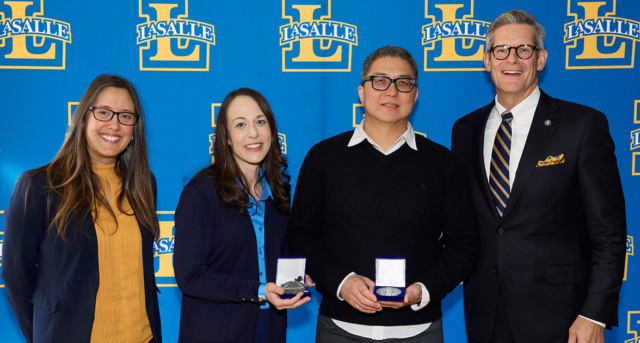La Salle University

Translation: English/Spanish—Spanish/English Certificate
- Certificate
- On Campus
What You’ll learn
The curriculum for the Certificate in Translation (CIT) is designed to address three of the principal environments in which Spanish/English translations are currently needed: legal, medical, and business environments.In addition, governing translation principles are also studied for application to language environments not covered by the program.
Why Study English/Spanish Translation at La Salle?
Spanish is spoken by more than 559 million people worldwide. A major in Spanish will open the worlds of all major industries such as business, healthcare, law, government, and education. Globally, effective written and oral communication with Spanish speakers is critically important as it is spoken in nineteen Latin American Countries, Spain, Equatorial Guinea, Western Sahara, Philippines, Andorra, and Gibraltar. Not only is Spanish one of the six working languages of the United Nations, but according to Pew Research, over 50% of the households in the United States will speak Spanish by 2050.
The Hispanic Institute at La Salle University was founded in 2005 by Dr. Luis A. Gómez. The purpose of the Institute is to offer professional academic programs that provide bilingual and bicultural education to all professionals serving the Hispanic communities throughout the region and the nation.
Highlighted Courses
BLS 614 – Legal Interpretation
This course further develops the skills in consecutive interpretation with note taking, sight translation, and simultaneous interpreting. Students are expected to apply the knowledge and skills acquired during the introductory courses and produce interpretations that would be of acceptable quality in a professional setting.
BLS 641 – Professional Uses of Spanish: Medical
The topics and linguistic skills covered in this course include the following: vocabulary, oral practice (Spanish-English and English- Spanish), ethnical norms, health-care practices in the U.S., the Hispanic culture of the patient, role-playing, writing of a short medical script, observation at a local hospital with bilingual services, and supplemental readings on specific diseases or community health problems.
BLS 642 – Professional Uses of Spanish: Business
This course provides students the opportunity to translate a variety of texts, with emphasis on current world economic and financial issues, international trade, and business and economic forecasts. Students learn to apply basic concepts of economics and business to real-world texts, thereby improving their command of the technical terminology of these fields.
Meet the Faculty
Upon graduation, you’ll have honed your written and verbal skills to be able to use them in the workplace. Our faculty members not only train you for your specific field but place you in real-life scenarios to learn collaborative and interpersonal skills, professionalism, and diligence.
Career Opportunities
The median annual wage for interpreters and translators was $49,110 in May 2021.
Employment of interpreters and translators is projected to grow 20 percent from 2021 to 2031, much faster than the average for all occupations.
About 9,200 openings for interpreters and translators are projected each year, on average, over the decade. Many of those openings are expected to result from the need to replace workers who transfer to different occupations or exit the labor force, such as to retire.

La Salle accounting and finance major Hammed Fofana, ‘25, is channeling ambition and experience into career capital.

As part of its annual Mission and Heritage Week celebration, La Salle University proudly recognized two outstanding members of its community with 2025 Distinguished Lasallian Educator Awards on April 9, 2025.

The 2025 Day of Giving raised the most money of all 12 Days of Giving to date, reaching more than $1.9 million in support of La Salle students.